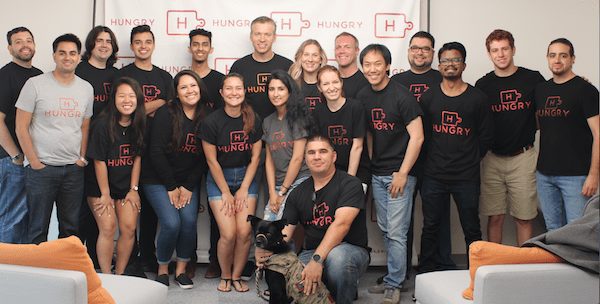
Jeff Grass knows not all office catered meals are especially palatable or cost-effective.
So, when the serial entrepreneur encountered an opportunity to address this problem while offering lower prices for companies, as well as creating a new career path and better pay for chefs, he jumped on board with HUNGRY in 2017 with company founders and brothers, Eman and Shy Pahlevani, to start HUNGRY Marketplace.
The company is “taking off like a rocket, growing over 600 percent in 2018 to a $6 million annualized sales run rate,” Grass said.
HUNGRY’s online marketplace provides access to top chef talent — think former White House chefs, Food Network stars and celebrity competitors, as well as able local chefs — who offer a limited number of their very best dishes. The menu is laid out in an easy-to-use interface that allows customers to select what they want to order, how much and specify whether there is anyone with allergies or other special requirements.
“HUNGRY was founded on the belief that office managers deserve an easier and more reliable solution for ordering food to the office, employees deserve delicious food that better matches their tastes and preferences, and chefs deserve greater economic opportunity, recognition and culinary freedom,” said Grass, chairman and CEO. “Our core purpose is to make the lives of everyone we touch better.”
 That includes a commitment to donating one meal for every two it sells through its Fight Against Hunger program. HUNGRY has provided 167,800 meals to feed those in the communities in which it operates —Washington, D.C., and Philadelphia.
That includes a commitment to donating one meal for every two it sells through its Fight Against Hunger program. HUNGRY has provided 167,800 meals to feed those in the communities in which it operates —Washington, D.C., and Philadelphia.
The business model leverages its 70-plus independent chefs to make a footprint in the $25 billion office catering market. Company officials say the average cost per meal to clients is about one-third less than the average for traditional catering businesses, but their chefs earn far more income. Grass said the secret to success lies in the company’s “decentralized, Uber-like model” that uses independent chefs who run their own kitchens. Some of those chefs are making $25,000 to $35,000 a month on the HUNGRY platform, he said.
 “Most cook out of incubator kitchens or other wholesale locations that have much lower overhead and costs than retail restaurant kitchens,” Grass said. “This creates significant cost savings for companies because we don’t have the operational overhead and fixed asset costs that the traditional providers do.
“Most cook out of incubator kitchens or other wholesale locations that have much lower overhead and costs than retail restaurant kitchens,” Grass said. “This creates significant cost savings for companies because we don’t have the operational overhead and fixed asset costs that the traditional providers do.
HUNGRY also created proprietary logistics software to handle food pickup and delivery — a strategic choice designed to take the hassle out of delivery with an on-time guarantee and impeccable service.
“Rather than outsourcing the delivery, we 100 percent own it to so we can ensure it’s amazing and always on-time,” Grass said. “Every meal is delivered by a HUNGRY Catering Captain. As a result, our kitchen, labor and delivery costs are less than half that of our competition — which then enables us to provide more valuable services like ultra-reliable delivery and VIP-level service for our clients and put more money in the chef’s pocket.”
The company is also leveraging artificial intelligence to create a custom fit for chefs and the food they make with the tastes and preferences of clients. New clients are oriented with a 2-minute food assessment survey in which they specify tastes, preferences and dietary restrictions across the office. Those surveys along with continuous feedback from individual caterings help fine-tune future transactions.

“The more you use us, the better we get and the happier your team will be,” Grass said. “We can also share the data with our chefs so they can customize their menus for an even better fit to your office preferences.”
Should a chef’s rating drop below four out of five stars, that chef will be removed from the program.
Grass believes HUNGRY is particularly relevant in the govcon space where employers are in a constant war for top talent. By investing in delicious and unique food for the office, it cuts down on long lunch breaks and brings together people, enhancing culture and communication, Grass said.
“It makes your people more productive and it makes your company a more attractive place to work,” he said.
“We are seeing companies order food in for their teams more and more frequently across the DMV, which puts pressure on the person ordering,” Grass continued. “The executive assistant is the person typically tasked with organizing all these purchases, which is both very time-consuming and a thankless task. HUNGRY is perfectly suited to take the hassles, headache and risk out of ordering food to the office. We hope everyone in the govcon space in the Washington, D.C., area will choose to give HUNGRY an opportunity to earn their business. You’ll also be supporting a local company, local chefs and helping feed the hungry in your local community!”
Grass says he has always harbored an “entrepreneurial streak” from the time he started a lawn mowing business in elementary school and to his building new product lines for his first professional employer, Travelers.
After successes with PayMyBills.com, buySAFE and LiveSafe, HUNGRY is now the fourth tech-oriented company Grass has led in the last 20 years but his first in the food business. Although his first-ever job was as a cook for Kentucky Fried Chicken, his professional focus has been on business-to-business-to-consumer technology-enabled services.
“I believe my life’s mission is to lead purpose-driven companies trying to solve big problems that will make people’s lives better,” he said.
He serves on the Board of Visitors at James Madison University and is active in his local chapter of YPO.
“Other than that, it’s time with my incredibly supportive wife, family, close friends and playing with my two awesome kids,” he said.

